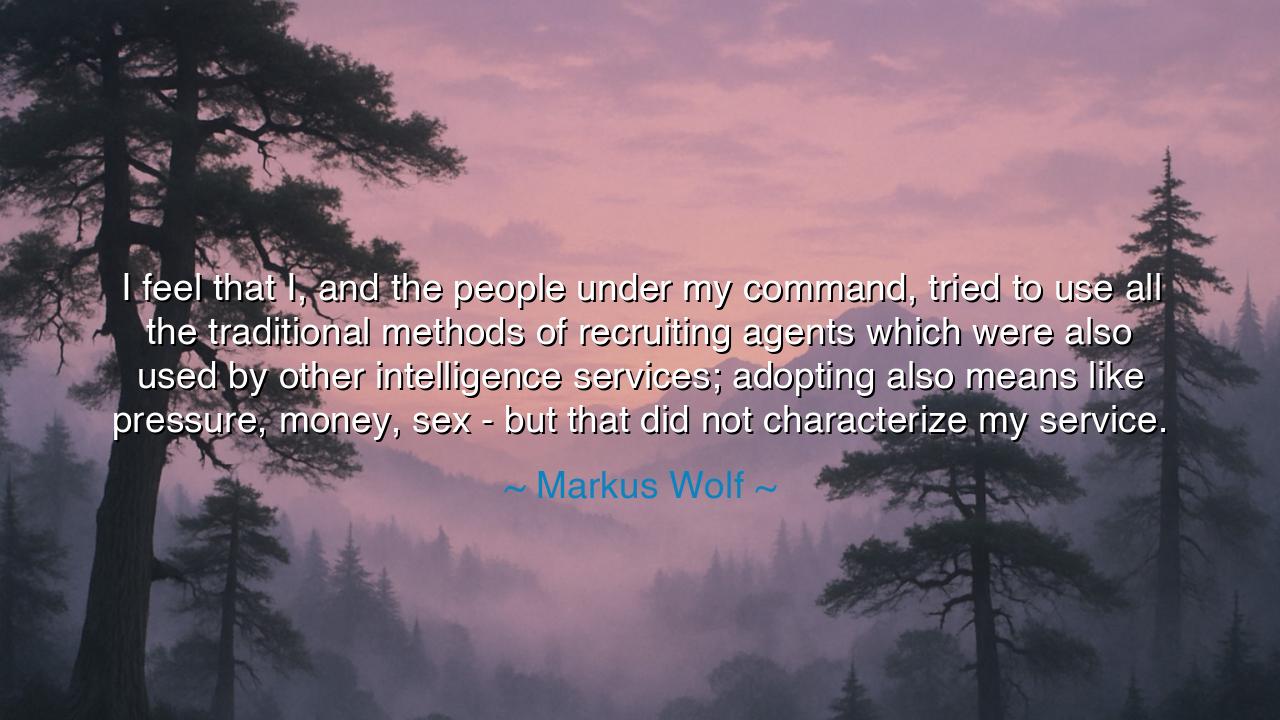
I feel that I, and the people under my command, tried to use all
I feel that I, and the people under my command, tried to use all the traditional methods of recruiting agents which were also used by other intelligence services; adopting also means like pressure, money, sex - but that did not characterize my service.






In the world of intelligence, where secrets and truths are often shrouded in shadows, the methods by which information is gathered have always been a subject of great complexity and ethical debate. Markus Wolf, a prominent figure in East German intelligence, speaks candidly when he says, “I feel that I, and the people under my command, tried to use all the traditional methods of recruiting agents which were also used by other intelligence services; adopting also means like pressure, money, sex - but that did not characterize my service.” Wolf’s words, while acknowledging the use of these methods, underscore a larger moral reflection on the nature of espionage and the personal integrity that must be preserved in the pursuit of national security.
In the ancient world, the art of spying and information gathering was often seen through the lens of honor and strategy. Sun Tzu, in his seminal work The Art of War, taught that intelligence was one of the five essential elements of warfare, but he also understood the moral and psychological aspects of espionage. Sun Tzu stated, “All warfare is based on deception,” yet he did not advocate for deceit at the expense of one’s honor or humanity. In his philosophy, intelligence and deception were tools of war, but integrity in how they were wielded was paramount. Wolf, similarly, acknowledges the use of traditional methods in intelligence work, yet implies that the ultimate character of a service should not be defined solely by these means.
The story of Hannibal, the Carthaginian general, offers a striking example of the delicate balance between strategic manipulation and ethical boundaries. Hannibal’s use of spies was instrumental in his conquest of the Roman Empire, but he was also a leader who valued the loyalty of his men and the honor of his cause. His intelligence network was vast and relied on a careful interplay of pressure and persuasion, not just bribery or coercion. Yet, despite his ruthless tactics on the battlefield, Hannibal’s leadership was ultimately defined by his ability to inspire trust and honor among those who followed him. In this light, Wolf’s distinction—that his intelligence service, while using traditional methods, was defined by something more—reflects the tension between strategic necessity and moral fortitude.
In modern history, the Cold War era provides a poignant backdrop for understanding the complex world of espionage and the moral dilemmas faced by those like Wolf. The CIA, MI6, and other intelligence agencies used a variety of means—pressure, money, and sometimes even sexual manipulation—to recruit spies. Yet, this period of intense geopolitical conflict also witnessed individuals such as Aldrich Ames, who betrayed his country despite the values of loyalty and integrity that espionage should ideally uphold. Ames’ treason was not just a betrayal of trust but also of the ethical guidelines that must govern the trade of intelligence. In contrast, Wolf’s reflection suggests that while these methods were employed, his own service was not marked by them alone, and there was a conscious effort to rise above such moral compromises.
Wolf’s words also raise a fundamental question about the nature of power and control in the world of espionage. Tactics like coercion, whether through money or sex, have long been associated with the manipulation of agents, and yet true intelligence does not lie in the exploitation of individuals, but in the ability to influence and persuade through trust, values, and mutual understanding. Much like the Romans, who used the idea of "divide and conquer" to weaken their enemies, Wolf suggests that intelligence can be cultivated through more refined methods—ones that preserve personal integrity while still achieving the necessary goals of national security.
The lesson here is one of balance and reflection: in the pursuit of any cause, whether it be in intelligence, leadership, or warfare, one must always maintain a careful watch over the methods used to achieve success. It is easy to justify the use of harsh tactics for a noble cause, but in doing so, we risk losing the very humanity we seek to protect. In your own life, whether you are in a leadership position or simply navigating the complexities of your personal relationships and decisions, remember that the ends do not always justify the means. Ethics, honor, and integrity should guide your actions, even when faced with difficult choices. The path of truth and honor is often more difficult to follow, but it is also the one that leads to the greatest peace and respect.
Thus, Markus Wolf teaches us that while the methods used in intelligence gathering may be controversial, the true character of an individual or a service is defined not by the tactics used, but by the moral compass that guides those choices. In the end, it is not the successes alone that matter, but how those successes are achieved. Integrity in the pursuit of any goal—be it national security, personal growth, or professional achievement—ensures that the legacy we leave is one of honor, and that our actions are worthy of respect, regardless of the challenges we face.






AAdministratorAdministrator
Welcome, honored guests. Please leave a comment, we will respond soon